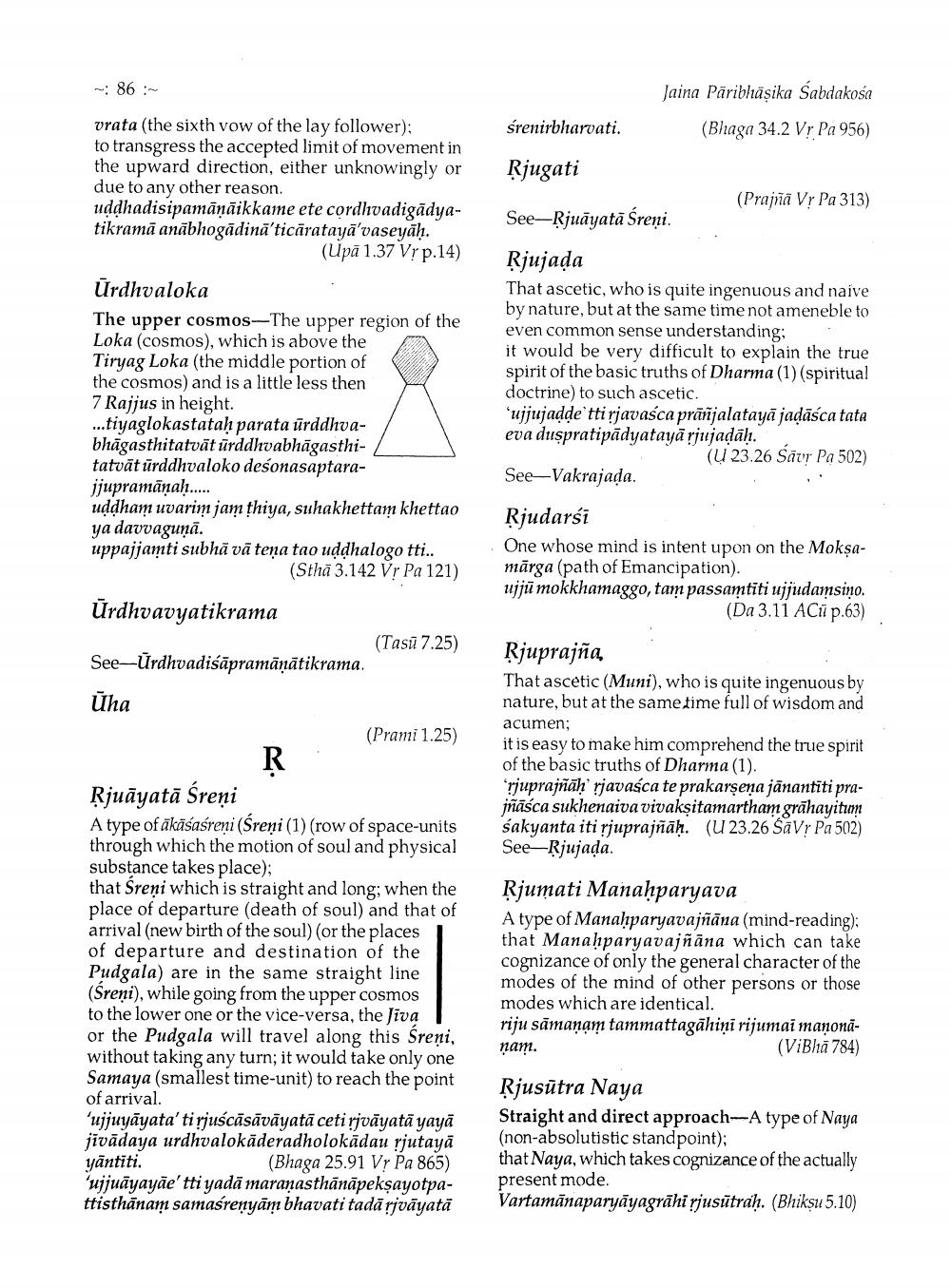________________
-
86
Jaina Pāribhāsika Sabdakosa
srenirbharvati.
(Bhaga 34.2 Vr Pa 956)
vrata (the sixth vow of the lay follower); to transgress the accepted limit of movement in the upward direction, either unknowingly or due to any other reason. uddhadisipamāṇāikkame ete cordhvadigādyatikramā anābhogādinā'ticāratayā'vaseyāḥ.
(upa 1.37 Vợp.14) ūrdhvaloka The upper cosmos-The upper region of the Loka (cosmos), which is above the Tiryag Loka (the middle portion of the cosmos) and is a little less then 7 Rajjus in height. ...tiyaglokastatah parata ürddhvabhāgasthitatvāt ürddhvabhāgasthitatvātürddhvaloko desonasaptarajjupramānah.... uddham uvarim jamshiya, suhakhettam khettao ya davvaguņā. uppajjamti subhā vā teņa tao uddhalogo tti..
(Sthā 3.142 Vr Pa 121)
Rjugati
(Prajā Vr Pa 313) See-Rjuāyatā śreņi. Rjujada That ascetic, who is quite ingenuous and naive by nature, but at the same time not ameneble to even common sense understanding; it would be very difficult to explain the true spirit of the basic truths of Dharma (1) (spiritual doctrine) to such ascetic. ‘ujjujaddetti rjavasca prāñjalatayā jadāsca tata eva duşpratipādyatayā rjujadāḥ.
(u 23.26 Savr Pa 502) See-Vakrajada.
Rjudarsi One whose mind is intent upon on the Mokşamārga (path of Emancipation). ujjū mokkhamaggo, tam passamtiti ujjudamsino.
(Da 3.11 ACū p.63)
ūrdhvavyatikrama
(Tasū 7.25) See-Urdhvadiśāpramāṇātikrama.
ūha
(Prami 1.25)
Rjuprajña That ascetic (Muni), who is quite ingenuous by nature, but at the same time full of wisdom and acumen; it is easy to make him comprehend the true spirit of the basic truths of Dharma (1). ‘rjuprajñāh rjavasca te prakarsena jānantīti prajñāśca sukhenaiva vivaksitamartham grāhayitum sakyanta iti rjuprajñāḥ. (U 23.26 ŚáVr Pa 502) See-Rjujada.
Rjuāyatā śreņi A type of ākāšaśreni (Sreņi (1) (row of space-units through which the motion of soul and physical substance takes place); that Sreņi which is straight and long; when the place of departure (death of soul) and that of arrival (new birth of the soul) (or the places of departure and destination of the Pudgala) are in the same straight line (Sreni), while going from the upper cosmos to the lower one or the vice-versa, the Jiva or the Pudgala will travel along this Śreni, without taking any turn; it would take only one Samaya (smallest time-unit) to reach the point of arrival. ‘ujjuyāyata' ti rjuścāsāvāyatā ceti rjvāyatā yayā jivādaya urdhvalokāderadholokādau rjutayā yāntiti.
(Bhaga 25.91 Vr Pa 865) 'ujjuāyayāe' tti yadā maraṇasthānāpekṣayotpattisthānam samasrenyām bhavati tadā rjvāyatā
Rjumati Manaḥparyava A type of Manahparyavajñāna (mind-reading); that Manahparyavajñāna which can take cognizance of only the general character of the modes of the mind of other persons or those modes which are identical. riju sāmanam tammattagāhini rijumai manonānam.
(ViBhā 784)
Rjusūtra Naya Straight and direct approach-A type of Naya (non-absolutistic standpoint); that Naya, which takes cognizance of the actually present mode. Vartamānaparyāyagrāhi rjusūtraḥ. (Bhikṣu 5.10)




